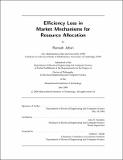Efficiency loss in market mechanisms for resource allocation
Author(s)
Johari, Ramesh, 1976-
DownloadFull printable version (2.014Mb)
Other Contributors
Massachusetts Institute of Technology. Dept. of Electrical Engineering and Computer Science.
Advisor
John N. Tsitsiklis.
Terms of use
Metadata
Show full item recordAbstract
This thesis addresses a problem at the nexus of engineering, computer science, and economics: in large scale, decentralized systems, how can we efficiently allocate scarce resources among competing interests? On one hand, constraints are imposed on the system designer by the inherent architecture of any large scale system. These constraints are counterbalanced by the need to design mechanisms that efficiently allocate resources, even when the system is being used by participants who have only their own best interests at stake. We consider the design of resource allocation mechanisms in such environments. The analytic approach we pursue is characterized by four salient features. First, the monetary value of resource allocation is measured by the aggregate surplus (aggregate utility less aggregate cost) achieved at a given allocation. An efficient allocation is one which maximizes aggregate surplus. Second, we focus on market-clearing mechanisms, which set a single price to ensure demand equals supply. Third, all the mechanisms we consider ensure a fully efficient allocation if market participants do not anticipate the effects of their actions on market-clearing prices. Finally, when market participants are price anticipating, full efficiency is generally not achieved, and we quantify the efficiency loss. We make two main contributions. First, for three economic environments, we consider specific market mechanisms and exactly quantify the efficiency loss in these environments when market participants are price anticipating. The first two environments address settings where multiple consumers compete to acquire a share of a resource in either fixed or elastic supply; these models are motivated by resource allocation in communication (cont.) networks. The third environment addresses competition between multiple producers to satisfy an inelastic demand; this model is motivated by market design in power systems. Our second contribution is to establish that, under reasonable conditions, the mechanisms we consider minimize efficiency loss when market participants anticipate the effects of their actions on market-clearing prices. Formally, we show that in a class of market-clearing mechanisms satisfying certain simple mathematical assumptions and for which there exist fully efficient competitive equilibria, the mechanisms we consider uniquely minimize efficiency loss when market participants are price anticipating.
Description
Thesis (Ph. D.)--Massachusetts Institute of Technology, Dept. of Electrical Engineering and Computer Science, 2004. Includes bibliographical references (p. 237-249). This electronic version was submitted by the student author. The certified thesis is available in the Institute Archives and Special Collections.
Date issued
2004Department
Massachusetts Institute of Technology. Department of Electrical Engineering and Computer SciencePublisher
Massachusetts Institute of Technology
Keywords
Electrical Engineering and Computer Science.